Abstract
The enterochromaffin-like (ECL) cell in the oxyntic mucosa has a key role in the regulation of gastric secretion since it synthesizes and releases the histamine regulating the acid secretion from the parietal cell. Gastrin is the main regulator of the ECL cell function and growth. Long-term hypergastrinemia induces ECL cell hyperplasia, and if continued, neoplasia. ECL cell carcinoids occur in man after long-term hypergastrinemia in conditions like pernicious anemia and gastrinoma. There is also accumulating evidence that a proportion of gastric carcinomas of the diffuse type is derived from the ECL cell. Furthermore, the ECL cell may, by producing substances with angiogenic effects (histamine and basic fibroblast growth factor), be particularly prone to develop malignant tumors. Although the general opinion is that gastrin itself has a direct effect on the oxyntic mucosal stem cell, it cannot be excluded that the general trophic effect of gastrin on the oxyntic mucosa is mediated by histamine or other substances from the ECL cell, and that the ECL cell, therefore, could play a role also in the tumorigenesis/carcinogenesis of gastric carcinomas of intestinal type.
Full text
PDF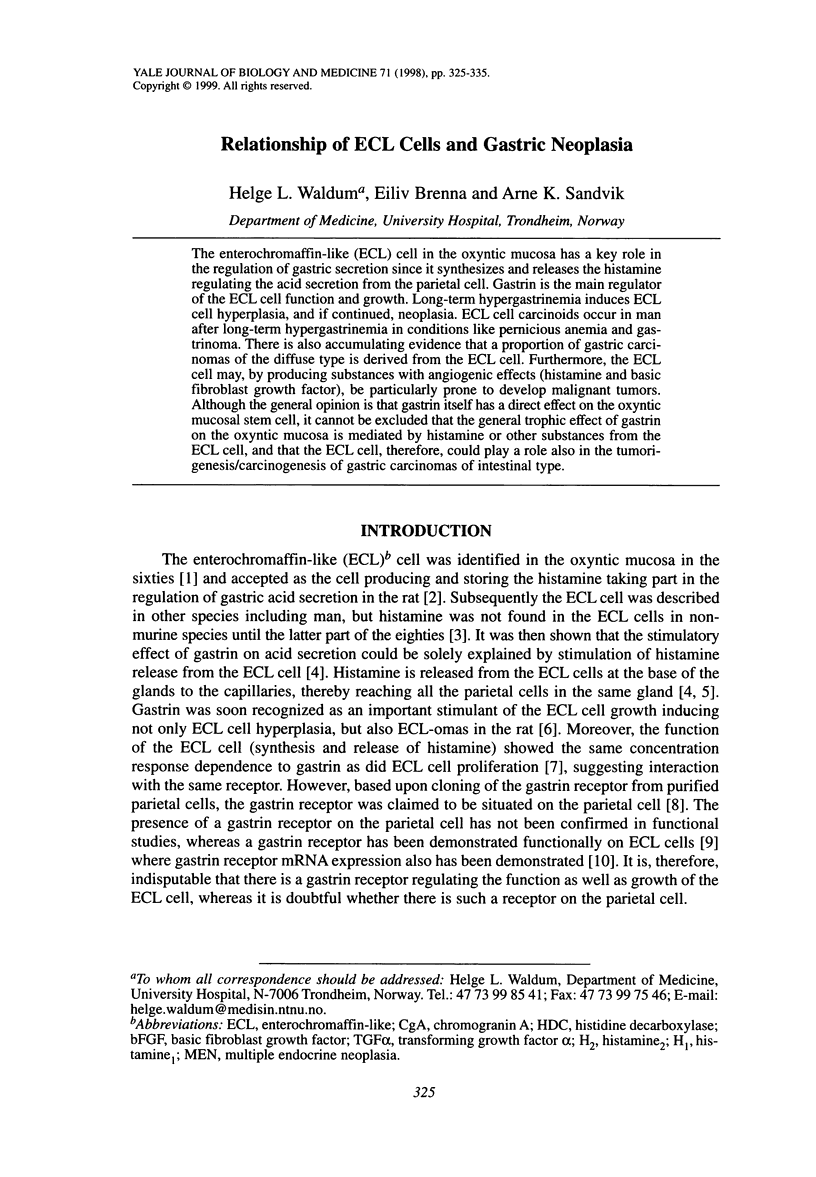
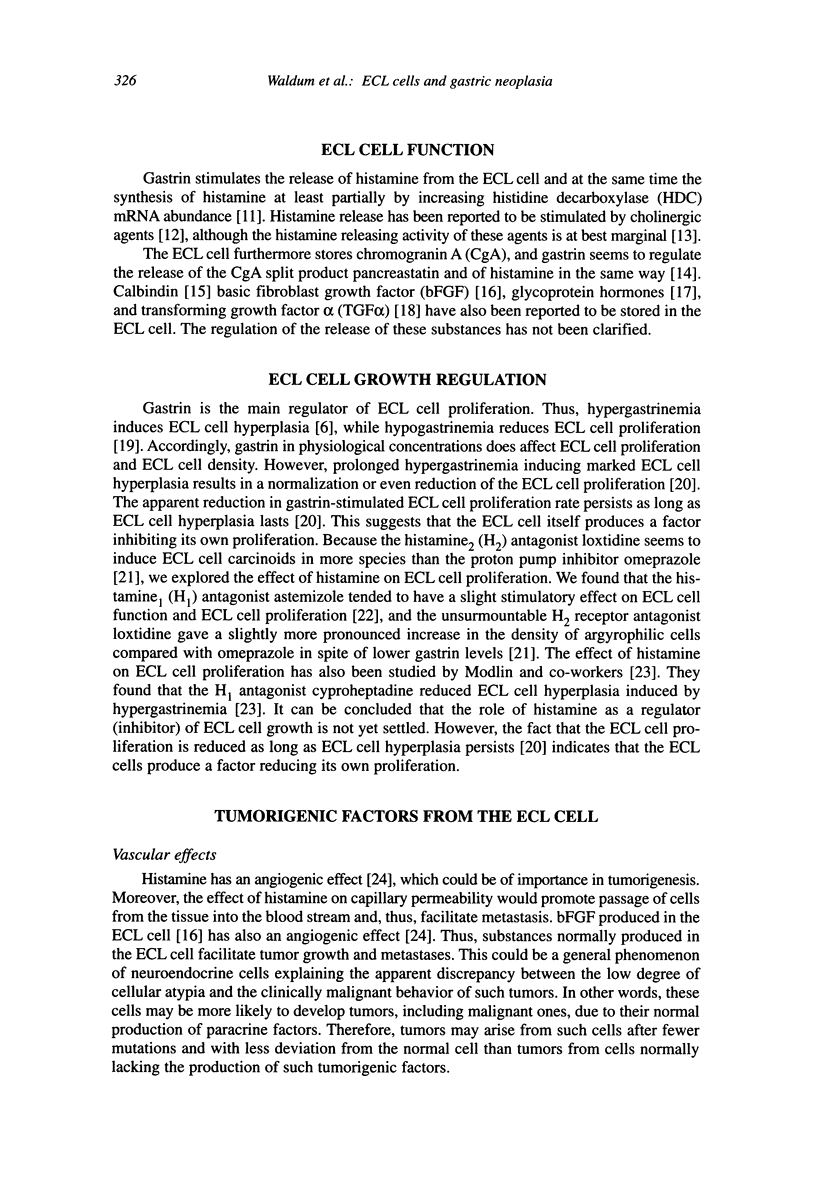
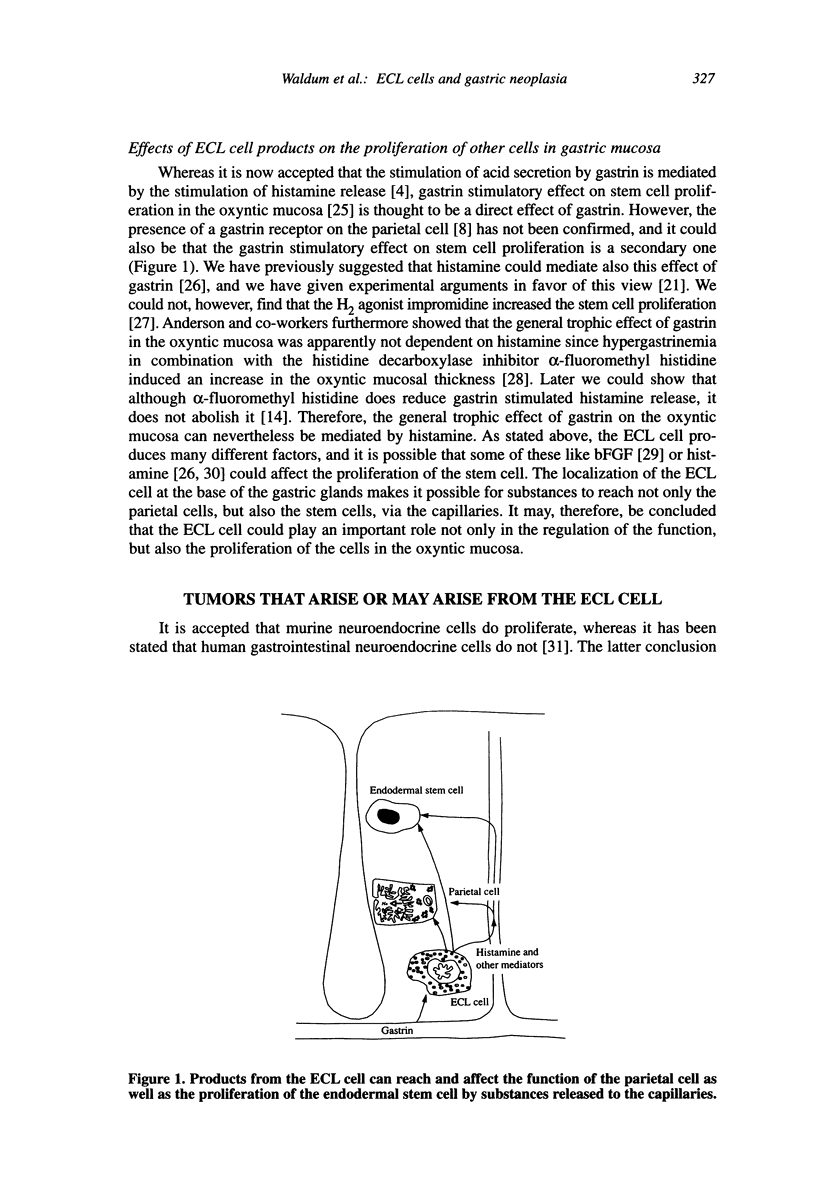
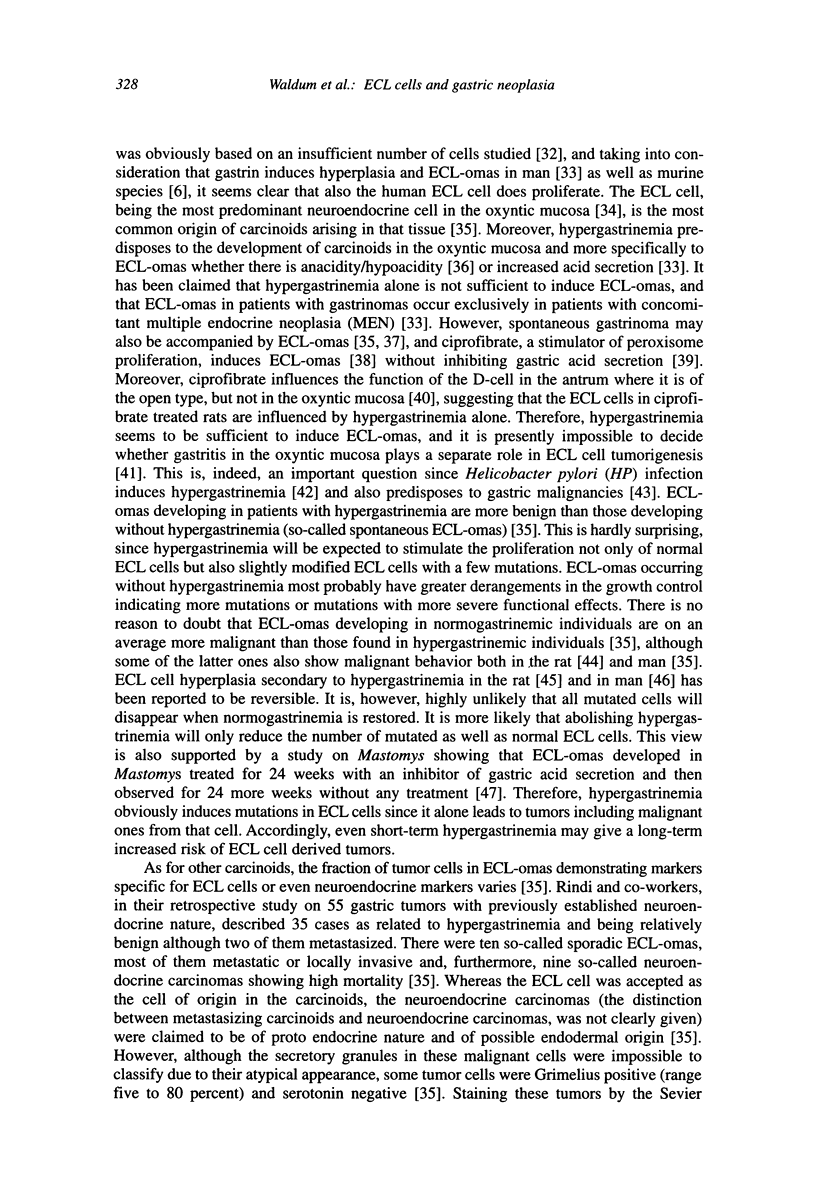
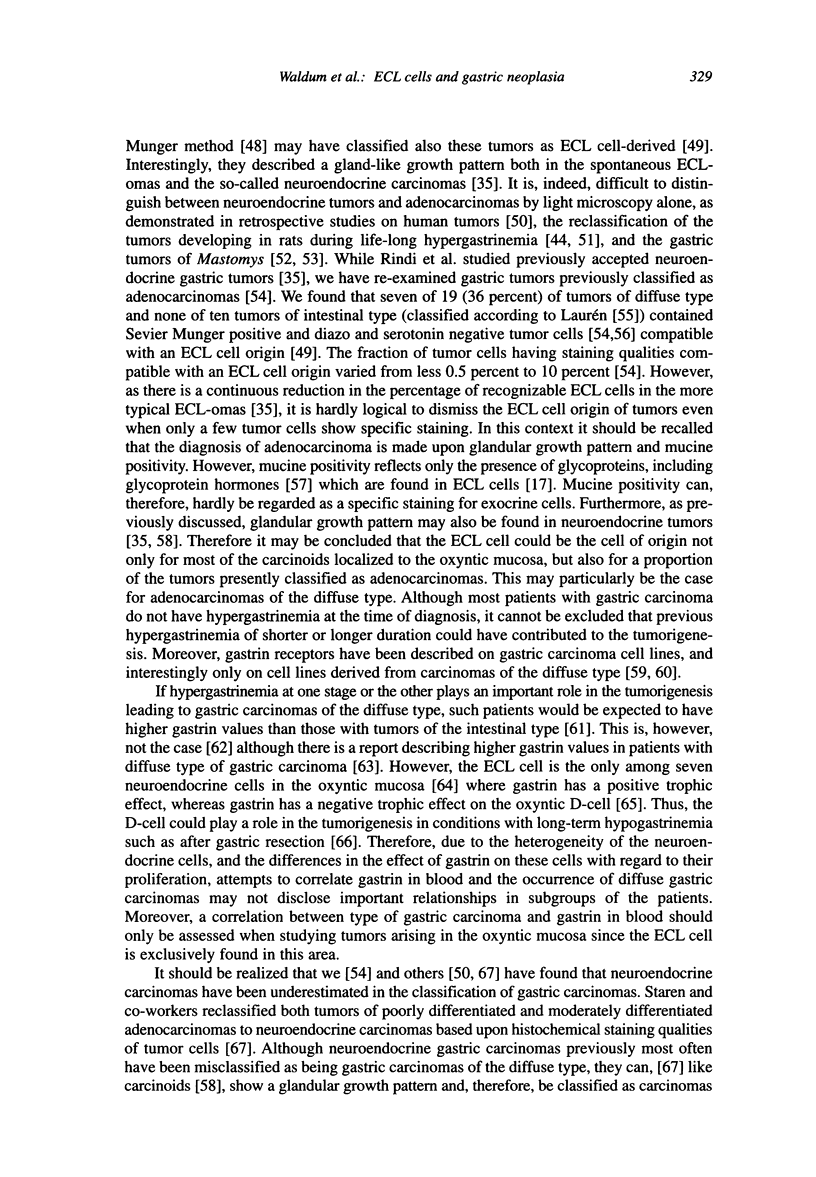
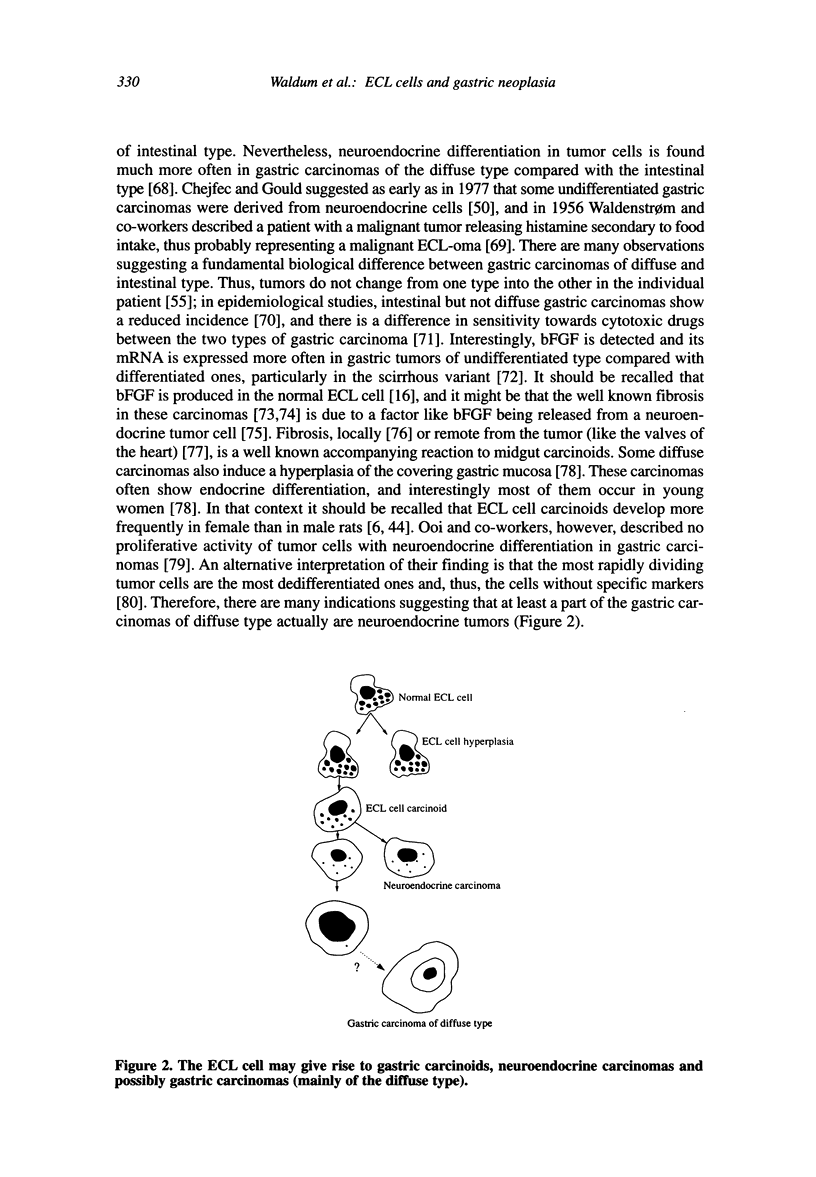
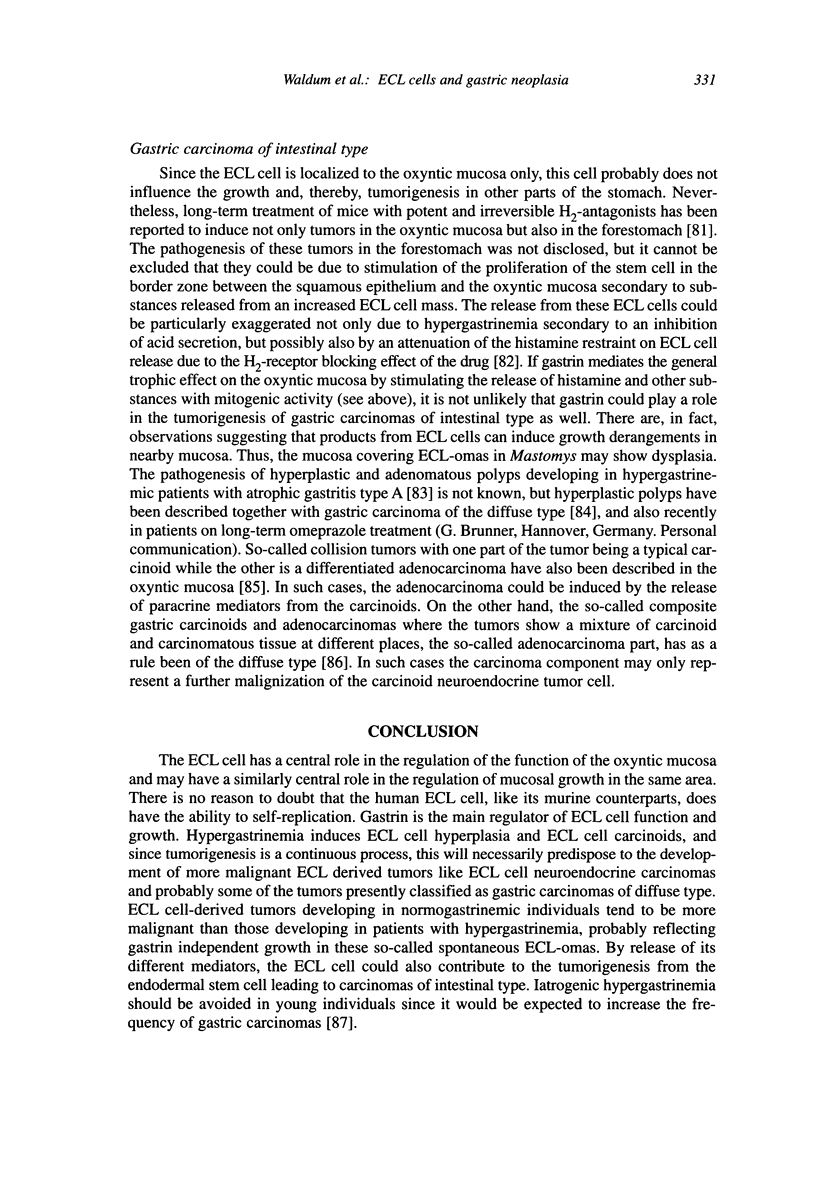
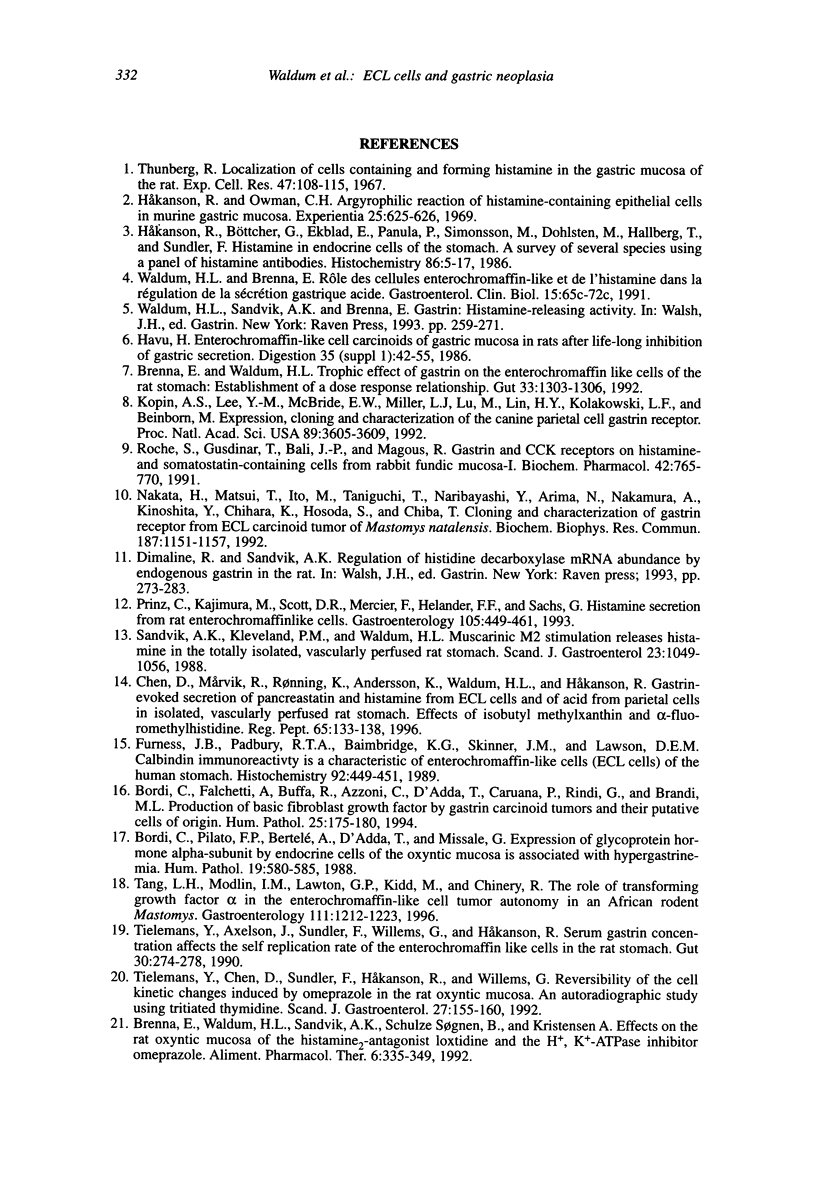
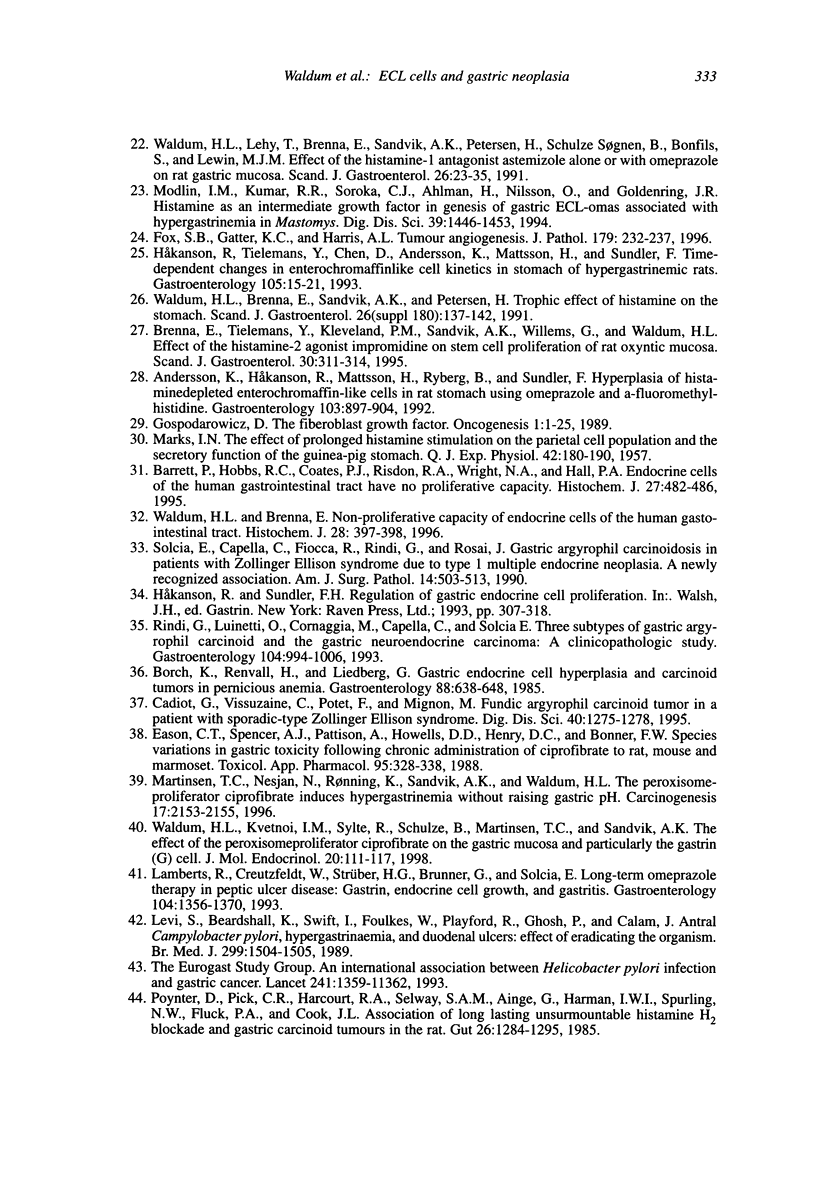
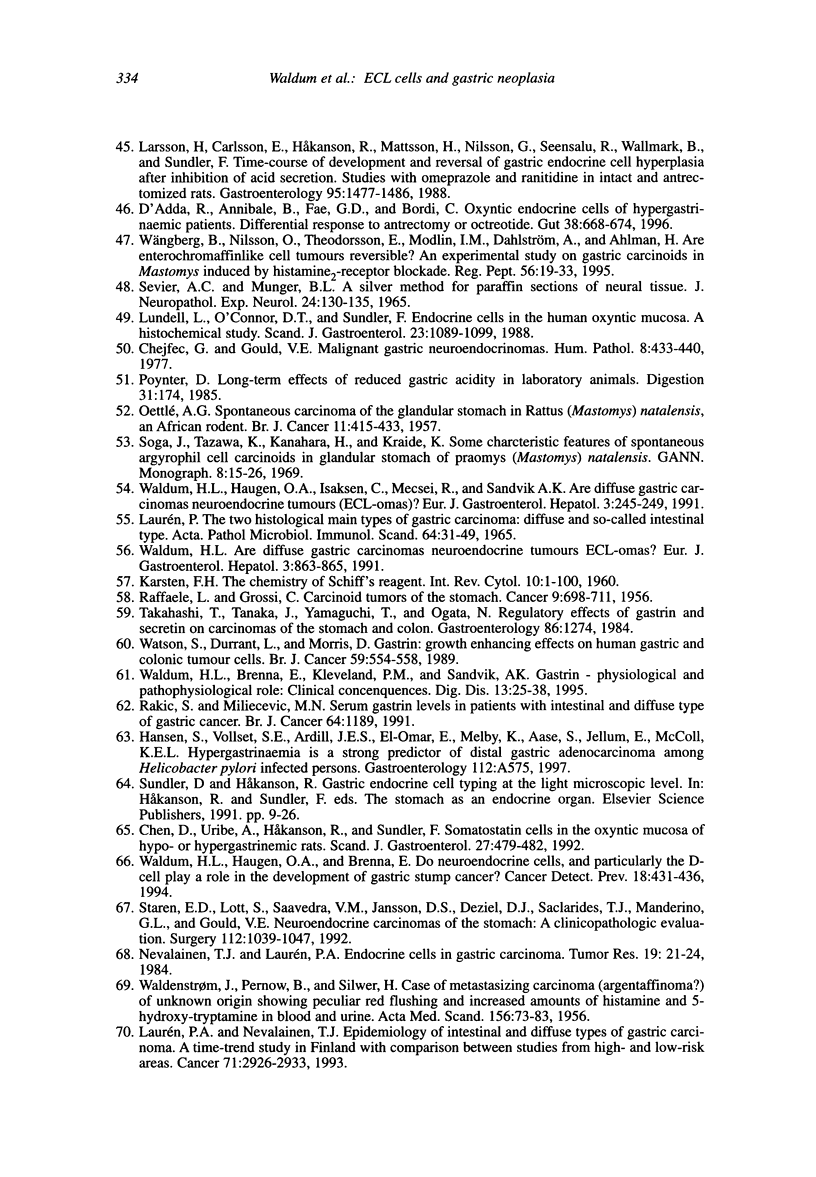
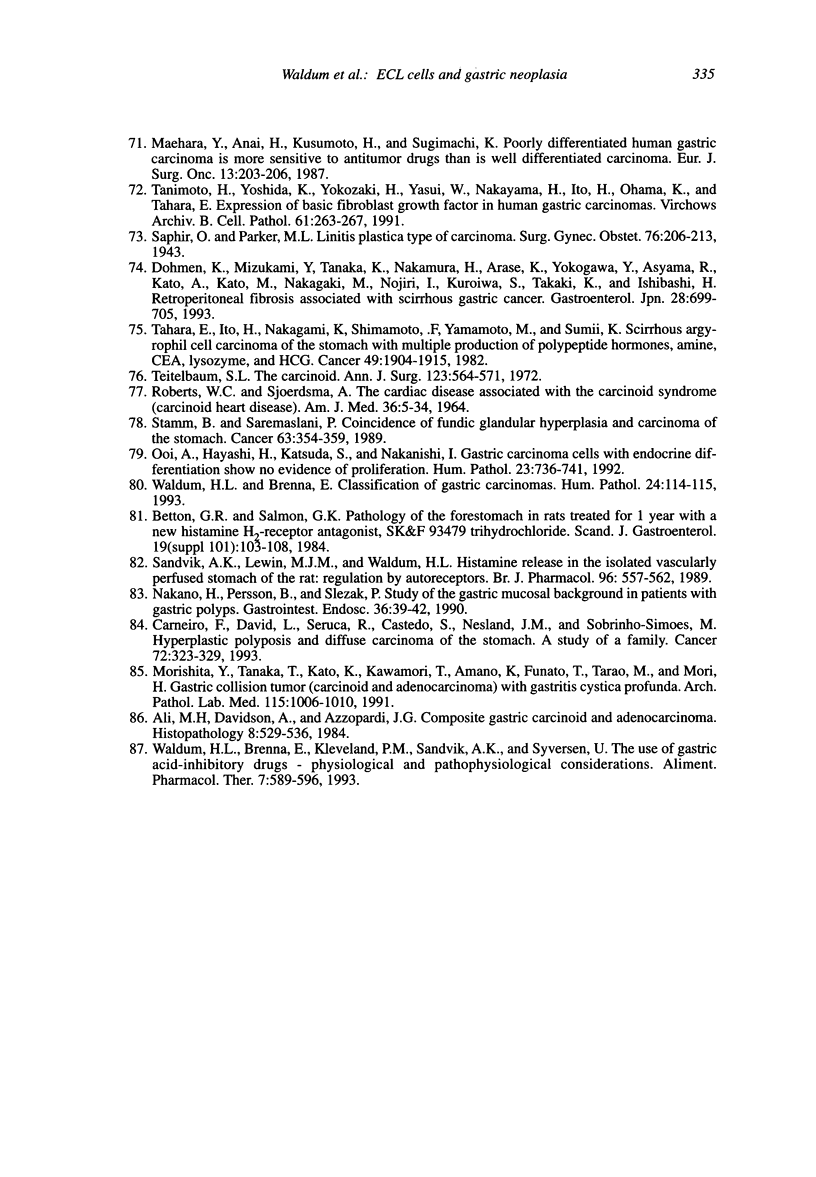
Selected References
These references are in PubMed. This may not be the complete list of references from this article.
- Ali M. H., Davidson A., Azzopardi J. G. Composite gastric carcinoid and adenocarcinoma. Histopathology. 1984 May;8(3):529–536. doi: 10.1111/j.1365-2559.1984.tb02362.x. [DOI] [PubMed] [Google Scholar]
- Andersson K., Håkanson R., Mattsson H., Ryberg B., Sundler F. Hyperplasia of histamine-depleted enterochromaffinlike cells in rat stomach using omeprazole and alpha-fluoromethylhistidine. Gastroenterology. 1992 Sep;103(3):897–904. doi: 10.1016/0016-5085(92)90023-r. [DOI] [PubMed] [Google Scholar]
- Barrett P., Hobbs R. C., Coates P. J., Risdon R. A., Wright N. A., Hall P. A. Endocrine cells of the human gastrointestinal tract have no proliferative capacity. Histochem J. 1995 Jun;27(6):482–486. [PubMed] [Google Scholar]
- Betton G. R., Salmon G. K. Pathology of the forestomach in rats treated for 1 year with a new histamine H2-receptor antagonist, SK&F 93479 trihydrochloride. Scand J Gastroenterol Suppl. 1984;101:103–108. [PubMed] [Google Scholar]
- Borch K., Renvall H., Liedberg G. Gastric endocrine cell hyperplasia and carcinoid tumors in pernicious anemia. Gastroenterology. 1985 Mar;88(3):638–648. doi: 10.1016/0016-5085(85)90131-3. [DOI] [PubMed] [Google Scholar]
- Bordi C., Falchetti A., Buffa R., Azzoni C., D'Adda T., Caruana P., Rindi G., Brandi M. L. Production of basic fibroblast growth factor by gastric carcinoid tumors and their putative cells of origin. Hum Pathol. 1994 Feb;25(2):175–180. doi: 10.1016/0046-8177(94)90275-5. [DOI] [PubMed] [Google Scholar]
- Bordi C., Pilato F. P., Bertelé A., D'Adda T., Missale G. Expression of glycoprotein hormone alpha-subunit by endocrine cells of the oxyntic mucosa is associated with hypergastrinemia. Hum Pathol. 1988 May;19(5):580–585. doi: 10.1016/s0046-8177(88)80208-9. [DOI] [PubMed] [Google Scholar]
- Brenna E., Tielemans Y., Kleveland P. M., Sandvik A. K., Willems G., Waldum H. L. Effect of the histamine-2 agonist impromidine on stem cell proliferation of rat oxyntic mucosa. Scand J Gastroenterol. 1995 Apr;30(4):311–314. doi: 10.3109/00365529509093282. [DOI] [PubMed] [Google Scholar]
- Brenna E., Waldum H. L., Sandvik A. K., Schulze Søgnen B., Kristensen A. Effects on the rat oxyntic mucosa of the histamine2-antagonist loxtidine and the H+, K(+)-ATPase inhibitor omeprazole. Aliment Pharmacol Ther. 1992 Jun;6(3):335–349. doi: 10.1111/j.1365-2036.1992.tb00055.x. [DOI] [PubMed] [Google Scholar]
- Brenna E., Waldum H. L. Trophic effect of gastrin on the enterochromaffin like cells of the rat stomach: establishment of a dose response relationship. Gut. 1992 Oct;33(10):1303–1306. doi: 10.1136/gut.33.10.1303. [DOI] [PMC free article] [PubMed] [Google Scholar]
- Cadiot G., Vissuzaine C., Potet F., Mignon M. Fundic argyrophil carcinoid tumor in a patient with sporadic-type Zollinger-Ellison syndrome. Dig Dis Sci. 1995 Jun;40(6):1275–1278. doi: 10.1007/BF02065537. [DOI] [PubMed] [Google Scholar]
- Carneiro F., David L., Seruca R., Castedo S., Nesland J. M., Sobrinho-Simões M. Hyperplastic polyposis and diffuse carcinoma of the stomach. A study of a family. Cancer. 1993 Jul 15;72(2):323–329. doi: 10.1002/1097-0142(19930715)72:2<323::aid-cncr2820720204>3.0.co;2-g. [DOI] [PubMed] [Google Scholar]
- Chejfec G., Gould V. E. Malignant gastric neuroendogrinomas. Ultrastructural and biochemical characterization of their secretory activity. Hum Pathol. 1977 Jul;8(4):433–440. doi: 10.1016/s0046-8177(77)80007-5. [DOI] [PubMed] [Google Scholar]
- Chen D., Mårvik R., Rønning K., Andersson K., Waldum H. L., Håkanson R. Gastrin-evoked secretion of pancreastatin and histamine from ECL cells and of acid from parietal cells in isolated, vascularly perfused rat stomach. Effects of isobutyl methylxanthin and alpha-fluoromethylhistidine. Regul Pept. 1996 Sep 9;65(2):133–138. doi: 10.1016/0167-0115(96)00082-1. [DOI] [PubMed] [Google Scholar]
- Chen D., Uribe A., Håkanson R., Sundler F. Somatostatin cells in the oxyntic mucosa of hypo- or hypergastrinemic rats. Scand J Gastroenterol. 1992 Jun;27(6):479–482. doi: 10.3109/00365529209000108. [DOI] [PubMed] [Google Scholar]
- D'Adda T., Annibale B., Delle Fave G., Bordi C. Oxyntic endocrine cells of hypergastrinaemic patients. Differential response to antrectomy or octreotide. Gut. 1996 May;38(5):668–674. doi: 10.1136/gut.38.5.668. [DOI] [PMC free article] [PubMed] [Google Scholar]
- Dohmen K., Mizukami Y., Tanaka K., Nakamura H., Arase K., Yokogawa Y., Asayama R., Kato A., Kato M., Nakagaki M. Retroperitoneal fibrosis associated with scirrhous gastric cancer. Gastroenterol Jpn. 1993 Oct;28(5):699–705. doi: 10.1007/BF02806351. [DOI] [PubMed] [Google Scholar]
- Eason C. T., Spencer A. J., Pattison A., Howells D. D., Henry D. C., Bonner F. W. Species variation in gastric toxicity following chronic administration of ciprofibrate to rat, mouse, and marmoset. Toxicol Appl Pharmacol. 1988 Sep 15;95(2):328–338. doi: 10.1016/0041-008x(88)90169-x. [DOI] [PubMed] [Google Scholar]
- Fox S. B., Gatter K. C., Harris A. L. Tumour angiogenesis. J Pathol. 1996 Jul;179(3):232–237. doi: 10.1002/(SICI)1096-9896(199607)179:3<232::AID-PATH505>3.0.CO;2-A. [DOI] [PubMed] [Google Scholar]
- Furness J. B., Padbury R. T., Baimbridge K. G., Skinner J. M., Lawson D. E. Calbindin immunoreactivity is a characteristic of enterochromaffin-like cells (ECL cells) of the human stomach. Histochemistry. 1989;92(5):449–451. doi: 10.1007/BF00492503. [DOI] [PubMed] [Google Scholar]
- GROSSI C., LATTES R. Carcinoid tumors of the stomach. Cancer. 1956 Jul-Aug;9(4):698–711. doi: 10.1002/1097-0142(195607/08)9:4<698::aid-cncr2820090412>3.0.co;2-i. [DOI] [PubMed] [Google Scholar]
- Havu N. Enterochromaffin-like cell carcinoids of gastric mucosa in rats after life-long inhibition of gastric secretion. Digestion. 1986;35 (Suppl 1):42–55. doi: 10.1159/000199381. [DOI] [PubMed] [Google Scholar]
- Håkanson R., Böttcher G., Ekblad E., Panula P., Simonsson M., Dohlsten M., Hallberg T., Sundler F. Histamine in endocrine cells in the stomach. A survey of several species using a panel of histamine antibodies. Histochemistry. 1986;86(1):5–17. doi: 10.1007/BF00492340. [DOI] [PubMed] [Google Scholar]
- Håkanson R., Owman C. Argyrophilic reaction of histamine-containing epithelial cells in murine gastric mucosa. Experientia. 1969 Jun 15;25(6):625–626. doi: 10.1007/BF01896554. [DOI] [PubMed] [Google Scholar]
- Håkanson R., Tielemans Y., Chen D., Andersson K., Mattsson H., Sundler F. Time-dependent changes in enterochromaffin-like cell kinetics in stomach of hypergastrinemic rats. Gastroenterology. 1993 Jul;105(1):15–21. doi: 10.1016/0016-5085(93)90005-w. [DOI] [PubMed] [Google Scholar]
- Kopin A. S., Lee Y. M., McBride E. W., Miller L. J., Lu M., Lin H. Y., Kolakowski L. F., Jr, Beinborn M. Expression cloning and characterization of the canine parietal cell gastrin receptor. Proc Natl Acad Sci U S A. 1992 Apr 15;89(8):3605–3609. doi: 10.1073/pnas.89.8.3605. [DOI] [PMC free article] [PubMed] [Google Scholar]
- LAUREN P. THE TWO HISTOLOGICAL MAIN TYPES OF GASTRIC CARCINOMA: DIFFUSE AND SO-CALLED INTESTINAL-TYPE CARCINOMA. AN ATTEMPT AT A HISTO-CLINICAL CLASSIFICATION. Acta Pathol Microbiol Scand. 1965;64:31–49. doi: 10.1111/apm.1965.64.1.31. [DOI] [PubMed] [Google Scholar]
- Lamberts R., Creutzfeldt W., Strüber H. G., Brunner G., Solcia E. Long-term omeprazole therapy in peptic ulcer disease: gastrin, endocrine cell growth, and gastritis. Gastroenterology. 1993 May;104(5):1356–1370. doi: 10.1016/0016-5085(93)90344-c. [DOI] [PubMed] [Google Scholar]
- Larsson H., Carlsson E., Håkanson R., Mattsson H., Nilsson G., Seensalu R., Wallmark B., Sundler F. Time-course of development and reversal of gastric endocrine cell hyperplasia after inhibition of acid secretion. Studies with omeprazole and ranitidine in intact and antrectomized rats. Gastroenterology. 1988 Dec;95(6):1477–1486. doi: 10.1016/s0016-5085(88)80066-0. [DOI] [PubMed] [Google Scholar]
- Laurén P. A., Nevalainen T. J. Epidemiology of intestinal and diffuse types of gastric carcinoma. A time-trend study in Finland with comparison between studies from high- and low-risk areas. Cancer. 1993 May 15;71(10):2926–2933. doi: 10.1002/1097-0142(19930515)71:10<2926::aid-cncr2820711007>3.0.co;2-x. [DOI] [PubMed] [Google Scholar]
- Levi S., Beardshall K., Swift I., Foulkes W., Playford R., Ghosh P., Calam J. Antral Helicobacter pylori, hypergastrinaemia, and duodenal ulcers: effect of eradicating the organism. BMJ. 1989 Dec 16;299(6714):1504–1505. doi: 10.1136/bmj.299.6714.1504. [DOI] [PMC free article] [PubMed] [Google Scholar]
- MARKS I. N. The effect of prolonged histamine stimulation on the parietal cell population and the secretory function of the guineapig stomach. Q J Exp Physiol Cogn Med Sci. 1957 Apr;42(2):180–189. doi: 10.1113/expphysiol.1957.sp001249. [DOI] [PubMed] [Google Scholar]
- Maehara Y., Anai H., Kusumoto H., Sugimachi K. Poorly differentiated human gastric carcinoma is more sensitive to antitumor drugs than is well differentiated carcinoma. Eur J Surg Oncol. 1987 Jun;13(3):203–206. [PubMed] [Google Scholar]
- Martinsen T. C., Nesjan N., Rønning K., Sandvik A. K., Waldum H. L. The peroxisome-proliferator ciprofibrate induces hypergastrinemia without raising gastric pH. Carcinogenesis. 1996 Oct;17(10):2153–2155. doi: 10.1093/carcin/17.10.2153. [DOI] [PubMed] [Google Scholar]
- Modlin I. M., Kumar R. R., Soroka C. J., Ahlman H., Nilsson O., Goldenring J. R. Histamine as an intermediate growth factor in genesis of gastric ECLomas associated with hypergastrinemia in mastomys. Dig Dis Sci. 1994 Jul;39(7):1446–1453. doi: 10.1007/BF02088047. [DOI] [PubMed] [Google Scholar]
- Morishita Y., Tanaka T., Kato K., Kawamori T., Amano K., Funato T., Tarao M., Mori H. Gastric collision tumor (carcinoid and adenocarcinoma) with gastritis cystica profunda. Arch Pathol Lab Med. 1991 Oct;115(10):1006–1010. [PubMed] [Google Scholar]
- Nakano H., Persson B., Slezak P. Study of the gastric mucosal background in patients with gastric polyps. Gastrointest Endosc. 1990 Jan-Feb;36(1):39–42. doi: 10.1016/s0016-5107(90)70920-0. [DOI] [PubMed] [Google Scholar]
- Nakata H., Matsui T., Ito M., Taniguchi T., Naribayashi Y., Arima N., Nakamura A., Kinoshita Y., Chihara K., Hosoda S. Cloning and characterization of gastrin receptor from ECL carcinoid tumor of Mastomys natalensis. Biochem Biophys Res Commun. 1992 Sep 16;187(2):1151–1157. doi: 10.1016/0006-291x(92)91317-j. [DOI] [PubMed] [Google Scholar]
- OETTLE A. G. Spontaneous carcinoma of the glandular stomach in Rattus (mastomys) natalensis, an African rodent. Br J Cancer. 1957 Sep;11(3):415–433. doi: 10.1038/bjc.1957.50. [DOI] [PMC free article] [PubMed] [Google Scholar]
- Ooi A., Hayashi H., Katsuda S., Nakanishi I. Gastric carcinoma cells with endocrine differentiation show no evidence of proliferation. Hum Pathol. 1992 Jul;23(7):736–741. doi: 10.1016/0046-8177(92)90341-y. [DOI] [PubMed] [Google Scholar]
- PERNOW B., SILWER H., WALDENSTROM J. Case of metastasizing carcinoma (argentaffinoma?) of unknown origin showing peculiar red flushing and increased amounts of histamine and 5-hydroxy-tryptamine in blood and urine. Acta Med Scand. 1956 Dec 8;156(2):73–83. doi: 10.1111/j.0954-6820.1956.tb00517.x. [DOI] [PubMed] [Google Scholar]
- Poynter D., Pick C. R., Harcourt R. A., Selway S. A., Ainge G., Harman I. W., Spurling N. W., Fluck P. A., Cook J. L. Association of long lasting unsurmountable histamine H2 blockade and gastric carcinoid tumours in the rat. Gut. 1985 Dec;26(12):1284–1295. doi: 10.1136/gut.26.12.1284. [DOI] [PMC free article] [PubMed] [Google Scholar]
- Prinz C., Kajimura M., Scott D. R., Mercier F., Helander H. F., Sachs G. Histamine secretion from rat enterochromaffinlike cells. Gastroenterology. 1993 Aug;105(2):449–461. doi: 10.1016/0016-5085(93)90719-s. [DOI] [PubMed] [Google Scholar]
- ROBERTS W. C., SJOERDSMA A. THE CARDIAC DISEASE ASSOCIATED WITH THE CARCINOID SYNDROME (CARCINOID HEART DISEASE). Am J Med. 1964 Jan;36:5–34. doi: 10.1016/0002-9343(64)90145-7. [DOI] [PubMed] [Google Scholar]
- Rakic S., Milicevic M. N. Serum gastrin levels in patients with intestinal and diffuse type of gastric cancer. Br J Cancer. 1991 Dec;64(6):1189–1189. doi: 10.1038/bjc.1991.489. [DOI] [PMC free article] [PubMed] [Google Scholar]
- Rindi G., Luinetti O., Cornaggia M., Capella C., Solcia E. Three subtypes of gastric argyrophil carcinoid and the gastric neuroendocrine carcinoma: a clinicopathologic study. Gastroenterology. 1993 Apr;104(4):994–1006. doi: 10.1016/0016-5085(93)90266-f. [DOI] [PubMed] [Google Scholar]
- Roche S., Gusdinar T., Bali J. P., Magous R. "Gastrin" and "CCK" receptors on histamine- and somatostatin-containing cells from rabbit fundic mucosa--I. Characterization by means of agonists. Biochem Pharmacol. 1991 Jul 25;42(4):765–770. doi: 10.1016/0006-2952(91)90034-3. [DOI] [PubMed] [Google Scholar]
- SEVIER A. C., MUNGER B. L. TECHNICAL NOTE: A SILVER METHOD FOR PARAFFIN SECTIONS OF NEURAL TISSUE. J Neuropathol Exp Neurol. 1965 Jan;24:130–135. doi: 10.1097/00005072-196501000-00012. [DOI] [PubMed] [Google Scholar]
- Sandvik A. K., Kleveland P. M., Waldum H. L. Muscarinic M2 stimulation releases histamine in the totally isolated, vascularly perfused rat stomach. Scand J Gastroenterol. 1988 Nov;23(9):1049–1056. doi: 10.3109/00365528809090168. [DOI] [PubMed] [Google Scholar]
- Sandvik A. K., Lewin M. J., Waldum H. L. Histamine release in the isolated vascularly perfused stomach of the rat: regulation by autoreceptors. Br J Pharmacol. 1989 Mar;96(3):557–562. doi: 10.1111/j.1476-5381.1989.tb11853.x. [DOI] [PMC free article] [PubMed] [Google Scholar]
- Simonsson M., Eriksson S., Håkanson R., Lind T., Lönroth H., Lundell L., O'Connor D. T., Sundler F. Endocrine cells in the human oxyntic mucosa. A histochemical study. Scand J Gastroenterol. 1988 Nov;23(9):1089–1099. doi: 10.3109/00365528809090174. [DOI] [PubMed] [Google Scholar]
- Solcia E., Capella C., Fiocca R., Rindi G., Rosai J. Gastric argyrophil carcinoidosis in patients with Zollinger-Ellison syndrome due to type 1 multiple endocrine neoplasia. A newly recognized association. Am J Surg Pathol. 1990 Jun;14(6):503–513. doi: 10.1097/00000478-199006000-00001. [DOI] [PubMed] [Google Scholar]
- Stamm B., Saremaslani P. Coincidence of fundic glandular hyperplasia and carcinoma of the stomach. Cancer. 1989 Jan 15;63(2):354–359. doi: 10.1002/1097-0142(19890115)63:2<354::aid-cncr2820630226>3.0.co;2-1. [DOI] [PubMed] [Google Scholar]
- Staren E. D., Lott S., Saavedra V. M., Jansson D. S., Deziel D. J., Saclarides T. J., Manderino G. L., Gould V. E. Neuroendocrine carcinomas of the stomach: a clinicopathologic evaluation. Surgery. 1992 Dec;112(6):1039–1047. [PubMed] [Google Scholar]
- Tahara E., Ito H., Nakagami K., Shimamoto F., Yamamoto M., Sumii K. Scirrhous argyrophil cell carcinoma of the stomach with multiple production of polypeptide hormones, amine, CEA, lysozyme, and HCG. Cancer. 1982 May 1;49(9):1904–1915. doi: 10.1002/1097-0142(19820501)49:9<1904::aid-cncr2820490925>3.0.co;2-i. [DOI] [PubMed] [Google Scholar]
- Tang L. H., Modlin I. M., Lawton G. P., Kidd M., Chinery R. The role of transforming growth factor alpha in the enterochromaffin-like cell tumor autonomy in an African rodent mastomys. Gastroenterology. 1996 Nov;111(5):1212–1223. doi: 10.1053/gast.1996.v111.pm8898635. [DOI] [PubMed] [Google Scholar]
- Tanimoto H., Yoshida K., Yokozaki H., Yasui W., Nakayama H., Ito H., Ohama K., Tahara E. Expression of basic fibroblast growth factor in human gastric carcinomas. Virchows Arch B Cell Pathol Incl Mol Pathol. 1991;61(4):263–267. doi: 10.1007/BF02890427. [DOI] [PubMed] [Google Scholar]
- Teitelbaum S. L. The carcinoid. A collective review. Am J Surg. 1972 May;123(5):564–572. doi: 10.1016/0002-9610(72)90221-8. [DOI] [PubMed] [Google Scholar]
- Thunberg R. Localization of cells containing and forming histamine in the gastric mucosa of the rat. Exp Cell Res. 1967 Aug;47(1):108–115. doi: 10.1016/0014-4827(67)90214-5. [DOI] [PubMed] [Google Scholar]
- Tielemans Y., Axelson J., Sundler F., Willems G., Håkanson R. Serum gastrin concentration affects the self replication rate of the enterochromaffin like cells in the rat stomach. Gut. 1990 Mar;31(3):274–278. doi: 10.1136/gut.31.3.274. [DOI] [PMC free article] [PubMed] [Google Scholar]
- Tielemans Y., Chen D., Sundler F., Håkanson R., Willems G. Reversibility of the cell kinetic changes induced by omeprazole in the rat oxyntic mucosa. An autoradiographic study using tritiated thymidine. Scand J Gastroenterol. 1992;27(2):155–160. doi: 10.3109/00365529209165437. [DOI] [PubMed] [Google Scholar]
- Waldum H. L., Brenna C. Classification of gastric carcinomas. Hum Pathol. 1993 Jan;24(1):114–115. doi: 10.1016/0046-8177(93)90074-q. [DOI] [PubMed] [Google Scholar]
- Waldum H. L., Brenna E., Kleveland P. M., Sandvik A. K. Gastrin-physiological and pathophysiological role: clinical consequences. Dig Dis. 1995 Jan-Feb;13(1):25–38. doi: 10.1159/000171484. [DOI] [PubMed] [Google Scholar]
- Waldum H. L., Brenna E., Kleveland P. M., Sandvik A. K., Syversen U. Review article: the use of gastric acid-inhibitory drugs--physiological and pathophysiological considerations. Aliment Pharmacol Ther. 1993 Dec;7(6):589–596. doi: 10.1111/j.1365-2036.1993.tb00139.x. [DOI] [PubMed] [Google Scholar]
- Waldum H. L., Brenna E. Non-proliferative capacity of endocrine cells of the human gastro-intestinal tract. Histochem J. 1996 May;28(5):397–398. doi: 10.1007/BF02331403. [DOI] [PubMed] [Google Scholar]
- Waldum H. L., Brenna E. Rôle des cellules enterochromaffin-like et de l'histamine dans la régulation de la sécrétion gastrique acide. Gastroenterol Clin Biol. 1991;15(5 ):65C–72C. [PubMed] [Google Scholar]
- Waldum H. L., Brenna E., Sandvik A. K., Petersen H. Trophic effect of histamine on the stomach. Scand J Gastroenterol Suppl. 1991;180:137–142. doi: 10.3109/00365529109093191. [DOI] [PubMed] [Google Scholar]
- Waldum H. L., Haugen O. A., Brenna E. Do neuroendocrine cells, particularly the D-cell, play a role in the development of gastric stump cancer? Cancer Detect Prev. 1994;18(6):431–436. [PubMed] [Google Scholar]
- Waldum H. L., Kvetnoi I. M., Sylte R., Schulze B., Martinsen T. C., Sandvik A. K. The effect of the peroxisome proliferator ciprofibrate on the gastric mucosa and particularly the gastrin cell. J Mol Endocrinol. 1998 Feb;20(1):111–117. doi: 10.1677/jme.0.0200111. [DOI] [PubMed] [Google Scholar]
- Waldum H. L., Lehy T., Brenna E., Sandvik A. K., Petersen H., Søgnen B. S., Bonfils S., Lewin M. J. Effect of the histamine-1 antagonist astemizole alone or with omeprazole on rat gastric mucosa. Scand J Gastroenterol. 1991 Jan;26(1):23–35. doi: 10.3109/00365529108996480. [DOI] [PubMed] [Google Scholar]
- Watson S., Durrant L., Morris D. Gastrin: growth enhancing effects on human gastric and colonic tumour cells. Br J Cancer. 1989 Apr;59(4):554–558. doi: 10.1038/bjc.1989.112. [DOI] [PMC free article] [PubMed] [Google Scholar]
- Wängberg B., Nilsson O., Theodorsson E., Modlin I. M., Dahlström A., Ahlman H. Are enterochromaffinlike cell tumours reversible? An experimental study on gastric carcinoids induced in Mastomys by histamine2-receptor blockade. Regul Pept. 1995 Mar 7;56(1):19–33. doi: 10.1016/0167-0115(95)00123-s. [DOI] [PubMed] [Google Scholar]


